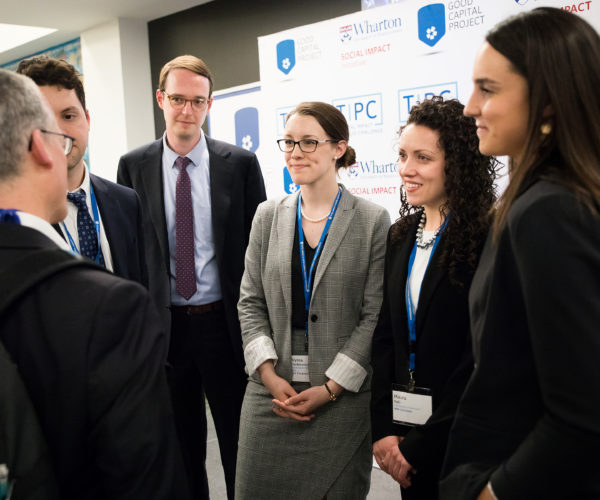Emily Klein admits she had a bad case of the jitters. With four of her MBA classmates at the University of Vermont, the 26-year-old found herself on a stage in front of an audience of impact investors boiling down a couple of hundred hours of work into a brief seven-minute presentation on May 2.
“The opportunity to present in front of 300 people in the industry who had worked on this for many years was definitely nerve-wracking,” says Klein. “Beyond the stage jitters, I was confident in my team and my friends. So while I was definitely nervous, it was a mix of excitement and nerves.”
As anxious as the five team members were, they couldn’t match the stress on their faculty advisor, finance professor Charles R. Schnitzlein. “They were nervous as hell, but I was nervous for them,” laughs Schnitzlein, who stopped off at Costco on Friday to pick up nine bottles of Champagne for a celebratory toast for the group. “It was like I was watching my 13-year-old daughter on stage for the first time.”
A TRIUMPHANT MOMENT FOR A RELATIVELY NEW UNIVERSITY OF VERMONT MBA PROGRAM
For Vermont’s tiny MBA program at the Grossman School of Business, it was a deliciously triumphant moment. The team claimed the top prize in the inaugural Total Impact Portfolio Challenge, the brainchild of Wharton’s Social Impact Initiative and the Good Capital Project, a unit of Intentional Media. The event, sponsored by Bank of America, posed an audacious goal: Reimagine impact investing and pitch a more innovative and effective way to invest capital in for-profit companies with a social conscious.
The victory was especially sweet because Vermont, with just 41 students in its one-year MBA program in Sustainable Innovation, beat many of the business school giants to get here, including finalists from Columbia Business School, Yale School of Management, Boston University, and Fordham University’s Gabelli School of Business. MBA teams from Wharton, Chicago Booth, and Northwestern Kellogg didn’t even make the finals in Philadelphia. Yet, the Vermont team will be just the fifth class to graduate from the MBA program.
The competition challenged MBA teams to deploy $100 million of capital from a family office $25 million from a family foundation in a way that would result in both positive change and performance. Each team had to construct a portfolio and an approach to investing the imaginary cash that made the case. Klein and her classmates—Andrew Mallory, Alyssa Stankiewicz, Maura Kalil, and Peter Seltzer—created a novel framework that went beyond the more commonplace Environment, Social, Governance (ESG) metrics to more smartly leverage their investment.
MBA TEAM CAME OUT OF A STRATEGY EXERCISE FOR THE UNIVERSITY’S ENDOWMENT
“What they did that was unique,” explains Schnitzlein. “Rather than using EFG scores, they looked at the materiality of the performance of firms in particular industries and how sustainability impacts performance. They looked at what are the things for a company in a specific industry that really impacts their sustainability performance. It’s different for ExxonMobil than it would be for UnitedHealthcare.”
The team came together voluntarily after working with Schnitzlein and a larger group that had worked on a strategy for the University of Vermont’s endowment to invest in sustainable companies. “It’s an intense MBA program, with students spending 60 hours a week on their academic work and yet they took this on as an extracurricular challenge,” adds the faculty advisor. “What really made me proud of this group is that they had to compete against some schools with a full-semester course designed to help students participate in the challenge. This was truly extracurricular.”
A little more than an hour after the MBAs walked off the stage, the Vermont group heard the good news of their win at an evening reception. “We were ecstatic and thrilled and proud to represent our MBA program and university,” beams Klein. “Hopefully, it will put Vermont and our program on the map a little more.”
‘IT WAS AMAZING HOW MANY PEOPLE FLOCKED TO THEM AT THE RECEPTION’
Their faculty advisor says he noticed the difference immediately at the conference. “When you win the prize, people show a lot more interest in you,” he says. “It was amazing how many people flocked to them at the reception. And there were so many impact investing professionals there and this is what they do for a living. So it was a real opportunity for them to network.”
Like her classmates, Klein was drawn to the school for its laser-like focus on sustainability. Every single course in the MBA curriculum is taught from the perspective of conscious capitalism. “The intellectual force behind the strategy is Dean Sanjay Sharma and several world experts in business sustainability, including superstar Stuart Hart. Full-time MBA programs are shrinking, and this program closely fits with the brand of Vermont. We thought it would be a way to make a difference.” In launching its treehugger-meets-capitalism MBA in 2014, Vermont shut down a part-time MBA program that had long been dependent on a shrinking IBM in the Burlington metro area.
Klein, a California native who majored in economics at Brown University, says she was attracted by the uniqueness of the Vermont program. “It is a pretty Millennial view to want to change the world through your work,” she says, “but I think there are a lot of opportunities to get rid of the shareholder primacy model and to effect real change. I came into the program with an interest in getting more women entrepreneurs. I’m interested in the movement of capital and who gets it and doesn’t.”
Klein and her classmates wrap up classes next week, then go into a three-month practicum project before graduating in August. “The conference was a great place to network and learn about opportunities,” she adds. Her dream job? “Any opportunity in impact investing where I’m able to effect change in this space.”
Source: poetsandquants.com
Photo: Chris Kendig
